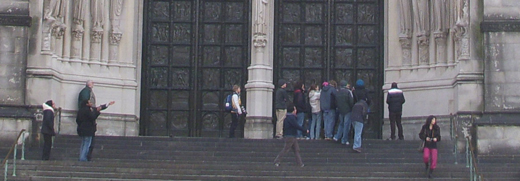Morning Read: Quiet
Thursday, December 18th, 2008¶ In “The Spirit-Spout,” the Pequod traverses the calm South Atlantic, where a ghostly silver spout, “like some plumed and glittering god uprising from the sea,” teases the crew with the promise of prey, and passes the “Cape Tormentoso,” as Melville would rename the Cape of Good Hope. The chapter is a small masterpiece of uneasy beauty, notable for its varied impressions of unearthly quiet.
Close to our bows, strange forms in the water darted hither and thither before us; while thick in our rear flew the inscrutable sea-ravens. And every morning, perched on our stays, rows of these birds were seen; and in spite of our hootings, for a long time obstinately clung to the hemp, as htough they deemed our ship some drifting, uninhabited craft: a thing appointed to desolation, and therefore fit roosting-place for their homeless selves. And heaved and heaved, still unrestingly heaved the black sea, as if its vast tides were a conscience; and the great mundane soul were in anguish and remorse for the long sin and suffering it had bred.
The hootings are silenced by their ineffectiveness.
Melville wraps all of this up with a picture, for once more grave than off-putting, of Ahab alone in his cabin, “the rain and half-melted sleet of the storm from which he had some time before emerged, still slowly dripping from the unremoved hat and coat.”
¶ Don Quixote discourses lovingly on the horrors of war, his anger spurred only by that most unchivalrous invention, artillery. It was modern artillery, of course, that put the old aristocratic cavalry out of business, setting its horsemen free to dream about the glories of hand-to-hand combat in the very romances that would drive our hero mad.
I grew up hearing the word “cavalry” as a synomym for the American military forces that subdued Native Americans in the old West. It had not occurred to me before today that the revival of medieval warfare made perfect sense when confronted by a Neolithic enemy.


















